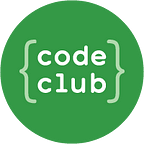Machine Learning — our latest pathway of projects
The latest release on our website is a collection of 4 Scratch projects that make up the Learning Pathway: Machine Learning. This new pathway introduces machine learning by providing hands-on experiences for training machine learning systems and building things with them.
The projects use the website Machine Learning for Kids, a web-based tool designed for use in classrooms and code clubs. The website provides pre-trained models linked to Scratch. Through the website, the Scratch platform has a variety of Scratch extension blocks used in the coding projects. Access to the website requires registration to save your projects. If registration is not an option, you can create one project at a time on the website without the need to register.
The four projects slowly introduce different options in machine learning.
- Smart Classroom — This project trains the machine to recognise commands to turn appliances on and off.
- Journey to School — This project trains the computer to look for patterns in data.
- Alien Project — This project trains the computer to recognise spoken words to control the movement of a sprite.
- Did you like it? — This project trains the computer to recognise messages as positive or negative to be able to determine if someone likes a movie or book.
In our current world, artificial intelligence (AI) and machine learning are hot topics, especially in education. AI is a term used to describe a machine or computer program that can use human-like thinking to undertake a task. Chat GPT quickly rose by word of mouth as a tool that could be used to write assignments, create blog posts, answers questions and write lesson plans with only a small amount of input from the user.
Machine Learning is all around us and can be found in systems that we use every day. Examples of this are search engines, chatbots, fraud detection systems, online help bots, digital assistants, and language translation services. We are also hearing more about progress in other areas such as self-driving cars, virtual doctors to help diagnose illnesses and smart assistants in shopping centres.
In 2019 the AI in Schools Report was published by the University of Newcastle. In the findings, it described how AI was, “in the easy stages of development for education.” It suggested that “Educators need to develop foundational knowledge of learning about and with AI in order to empower students to thrive in an AI world.” Four years later and we are seeing the impact that AI is starting to have.
A news article in January 2023 in The Guardian headlined that “Australian schools (are) ‘flying blind’ on use of ChatGPT and other learning technology.” The article referenced universities and schools reacting to the sudden rise of AI in education by returning to paper and pen-style tests and assessments and having a flat ban on the use of AI tools in schools.
Our task as educators is to ensure we keep up to date with new technologies and look at how these can be used to support learning. It’s also a chance to see how they can be used to benefit us. Teachers have quickly started using AI to write lesson plans, find information, write newsletter articles, and even look at how to incorporate the use of AI in their teaching to teach critical and creative thinking skills. It is also important to bring in the ethical and social impacts that the use of AI technologies will have in our future.
Our younger coders may not be ready for these deep conversations, but engaging them in the technology early will help them to understand how it works and the potential it has, and is a great place for our coders to start. And at the very start of exploring machine learning, is an understanding that a person needs to create the code to train the computer, focusing on our own ability to be a coder and think computationally.
Happy coding!
Kaye North, Code Club Australia
